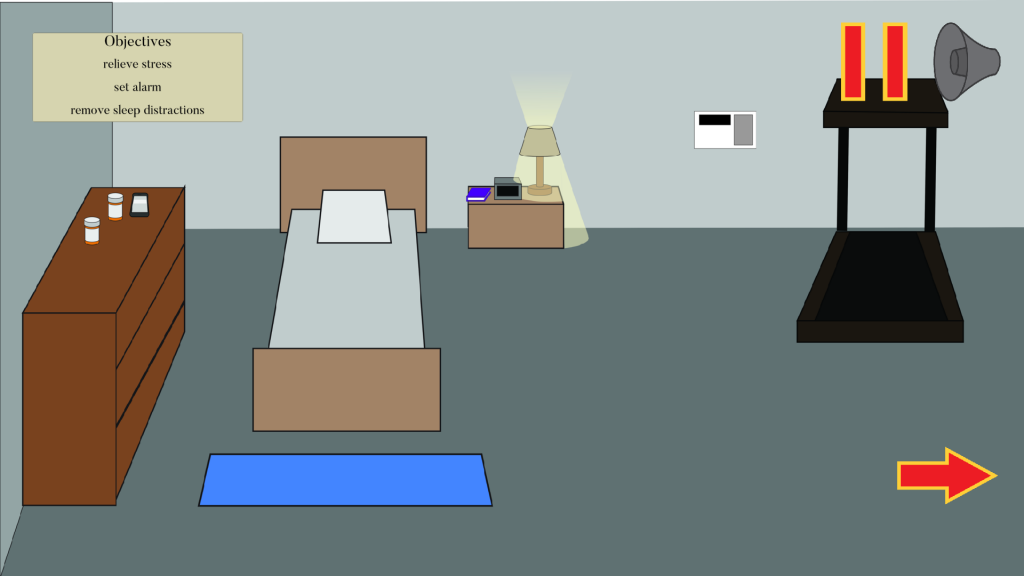Epilepsy and video games would seem to go as well together as a broken air conditioner and 100-degree heat. The stimulation and rapid motion on the screen can trigger seizures. Perhaps that’s why John Mallaney hadn’t the foggiest of ideas of how to pair the two unlikely sources together.
The executive director of Streator Unlimited, a nonprofit organization serving adults with intellectual and developmental disabilities in nearby Streator, was in a focus group centered on developing basic life skills in clients with epilepsy. He noticed a young man with epilepsy who was particularly disappointed that he couldn’t play most video games due to his condition. Mallaney wondered if there was a way to incorporate life skills into an epilepsy-friendly video game format.
That was a tall task, and Mallaney was searching for a place that might be willing to take on such a project. Without any previous professional relationships between the two, he reached out to the School of Information Technology at Illinois State last November. By the end of June, six Illinois State students in the Game Development Club had created such a product after months of making the seemingly impossible possible.
“I looked at the internet for IT in the area, and I just called and got lucky,” said Mallaney, who originally spoke with School of IT staff member Tal Parmenter. “The students were just amazing.”
Michael Reyes, who graduated in May with a degree in computer science, programmed the game. He didn’t know much about epilepsy before signing on to the project and had trouble envisioning the final concept.
“I thought it was strange that we were making a game for people with epilepsy, since I always see warnings in games to not play if you have epilepsy,” Reyes said.
With the challenge at hand, Reyes and his teammates—Chance Cook, Anthony Wilczynski, Lizzy Parvin, Jacob Tolonen, and Nate Phillips—began researching. “I looked at it as an opportunity to exercise the abilities that we already had,” said Cook, the group’s lead designer. “I recognized the challenge. We couldn’t have constant scene changes. We would have to do everything kind of slowly with muted colors.”
Despite having to collaborate virtually because of the coronavirus (COVID-19) pandemic, the team was able to develop three concepts to pitch to Streator Unlimited by April 23.
Cook concluded after initial research that the game should have limited stimulation and geared to people who wouldn’t be able to follow complex objectives.
He immediately thought back to games he played as a kid such as Spy Fox and Pajama Sam and the simplistic yet educational opportunities they provided. Streator Unlimited eventually settled on a point and click, first-person story adventure where the user simulates various tasks throughout the day. The group used Discord to create the game, which they titled Epilepsy Self Care with Streator Unlimited.
The game starts with the user waking up in the morning and having to complete steps before advancing to the next room. For example, to encourage taking morning medicines, players are supposed to click on the medicine bottle before advancing to the next healthy habit in the routine.

Here is a bedroom scene in Epilepsy Self Care with Streator Unlimited. Players must complete tasks by clicking on objects in the room that promote and develop healthy life habits.
Mallaney wanted the group to especially emphasize nutrition. During her research, Parvin noted that a ketogenic, low-carb diet could be helpful for managing symptoms. Parvin, who served as the group’s artist, stressed that diet choice in the kitchen setting.
“When I was working on the concept art for one of the storyboard ideas, I based the options I’d put in the fridge heavily on options that were keto-friendly, since I could safely be sure that those foods wouldn’t make epileptic seizures worse,” she said.
To win the game, clients must be able to maneuver through all the tasks and make it to the end of the day.
“It is very functional and relatable to exactly what you do every day and all of the choices you are making,” Mallaney said. “It keeps you healthier and makes you less likely to have seizures. It seemed really practical.”
The students took charge of the project and made it their own. They showed leadership and project management skills in developing a plan and executing it under difficult circumstances, all while enhancing their technical game development skills.
“They powered through and largely delivered this game that they weren’t getting paid or course credit,” School of IT Director Dr. Traci Carte said. “They were doing it for public service. This just speaks to the fact that they picked the right career for themselves. It helped them understand how their tech knowledge can benefit society.”
The game’s publication is now being finalized, and Streator Unlimited has previewed it with some clients. According to Mallaney, initial feedback has been overwhelmingly positive.
“They were doing it for public service. This just speaks to the fact that they picked the right career for themselves. It helped them understand how their tech knowledge can benefit society.”— School of Information Technology Director Dr. Traci Carte
Now, the next step for the students is to navigate the application delivery structure to secure a license so the game makes its way to the App Store or Google Play for wider distribution.
Cook originally entered game development to entertain people. Through this project, he and his teammates have the seen the potential to provide much more than entertainment.
“The ability to make an actual impact on people’s lives and help people who don’t necessarily learn in the same way other people do and improve their quality of life is amazing,” he said. “That was the biggest thing with this project.”

